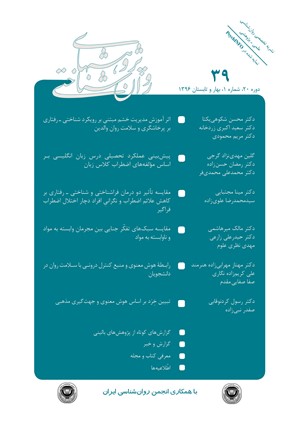رابطة هوش معنوی و منبع کنترل درونی با سلامت روان در دانشجویان
محورهای موضوعی :
1 - دانشگاه شهید چمران اهواز
کلید واژه: هوش معنوی منبع کنترل درونی سلامت روان,
چکیده مقاله :
هدف پژوهش حاضر، تعیین رابطة هوش معنوی و منبع کنترل درونی با سلامت روان در دانشجویان بود. در این پژوهش، به روش نمونهگیری تصادفیِ چندمرحلهای 400 نفر از دانشجویان دختر و پسر مقطع کارشناسی دانشگاه شهید چمران اهواز انتخاب شدند. شرکتکنندگان در پژوهش، پرسشنامة هوش معنوی-24 (SISRI-24)، منبـع کنتـرل درونی نوویکـی ـ استـریـکلند (LOCQ)، و سلامت عمومی (GHQ-28) را تکمیل کردند. نتایج محاسبة همبستگی های ساده نشان داد که هوش معنوی و سه بُعد آن (معناداری شخصی، هوشیاری متعالی، و گسترش حالت هوشیاری) با سلامت روان رابطة مثبت و معناداری دارند، اما رابطة بین تفکر انتقادی (یکی از ابعاد هوش معنوی) و سلامت روان معنادار نیست. بهعـلاوه، منبع کنتـرل درونی با سلامت روان رابـطة مثبت و معنـاداری دارد. نتـایج حـاصل از تحلیل رگرسیـون نشان دادنـد کـه در پیش بینـی رگرسیون ابعاد هوش معنوی (تفکر انتقادی، معناداری شخصی، هوشیاری متعالی، و گسترش حالت هوشیاری) با سلامت روان نشان داد که تنها معناداری شخصی، قادر به پیش بینی 0/05 از سلامت روان است.
Abstract: The purpose of the present study was to determine the relationship between spiritual in-telligence and locus of control with students' men-tal health. To do so, 400 male and female under-graduate students at Shahid Chamran University of Ahwaz were selected as subjects through ran-dom multistage sampling. The subjects completed the King's Spiritual Intelligence Self-Report In-ventory (SISRI-24) the Nowicki-Strickland's Lo-cus of Control Questionnaire (LOCQ), and Ge-neral Health Questionnaire (GHQ-28). By apply-ing simple correlation, the findings showed that there was a significant and positive correlation between spiritual intelligence and its three dimen-sions (personal meaning production, transcend-dental consciousness, and consciousness state ex-pansion) with mental health. However, there was no significant correlation between critical thinking (one dimension of spiritual intelligence), and men-tal health. In addition, there existed asignificant relation between locus of control and mental hea-lth. The results from regression analysis indicated that locus of control and spiritual intelligence, res-pecttively, play a role in predicating the mental health. Besides, the regression analysis of spiritual intelligence dimensions (critical thinking, personal meaning production, transcendental consciousness, and consciousness state expansion) indicated that only the personal meaning production can pre-dicate 0.05 of mental health.


